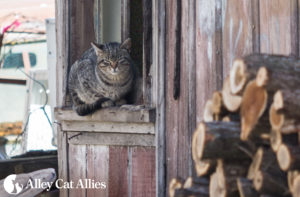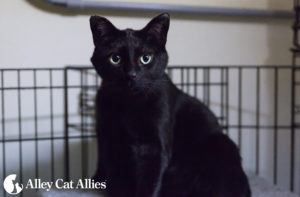If officials in Jefferson believe they can’t afford humane, effective programs to address cats, they need only to look to neighboring Iowa communities to find model programs and practices. Many towns and counties throughout the state haven’t been rounding up and killing cats by gunshot to address cat populations. Instead, they’ve been running humane programs like Trap-Neuter-Return – with great success.
Animal Protection and Education (A.P.E.), an Alley Cat Allies Feral Friends Network member, has spayed or neutered an estimated 15,000 feral or stray cats (also called community cats) since it was founded in 2003. Based in Paton, Greene County, about 12 miles from Jefferson, A.P.E. says it is Iowa’s largest provider of TNR services. It has helped to implement TNR in surrounding counties in central Iowa. Almost all these communities are rural, and some lack an animal shelter, veterinary clinics, or animal control services.
A.P.E.’s team of 50 volunteer veterinarians and veterinary technicians often drive for miles throughout the state, using A.P.E.’s mobile veterinary clinic, to provide spay and neuter services. The mobile clinic is housed in a van equipped with a small surgery area.

Linn Price, A.P.E.’s director, has been trying for years to introduce TNR in Jefferson – with no success. She was present at the recent City Council meeting in April when Jefferson officials acknowledged to the public that police officers had been fatally shooting cats. She told city officials that TNR is the path forward.
“I keep telling them: TNR just works,” says Price. “And it’s not a secret. Almost all the little towns around us are doing TNR because they see the benefits. What Jefferson is doing now simply isn’t working.”
Price says that when people want to protect community cats, and then learn about the benefits of TNR, they come together and find a way to do so. That is exactly what happened in the nearby Iowa communities of Winterset, Boone, Cedar Rapids, and others.
In the small rural city of Winterset in Madison County, with a population of just over 5,000, there is no city-funded shelter facility. (In January 2017, Lucky Paws of Madison County, a nonprofit, opened a shelter with private donations.) Winterset’s animal control solely handles dog-related issues and does not respond to calls about cats. Instead, community cats are served through a successful city-funded TNR program headed by local rescue Street Tails, Inc.
Eight years ago, the situation was much different. Price and A.P.E. received a call from frustrated Winterset resident Cindy Hays because the city failed to effectively address the community cat population. She says the city had blown through its animal control budget trapping and killing cats. With A.P.E.’s help, Hays began educating her city officials and police about a humane and less expensive option: TNR.
In July 2014, the city agreed to allocate funds specifically for spay and neuter services for community cats within city limits. Hays formed Street Tails, Inc., that September. Since then, at least 500 community cats have gone through TNR. The city has been funding TNR every year since.
Lucky Paws of Madison County, which runs its own privately-funded TNR program, has spayed or neutered 220 community cats since January 2017.
Hays and Mark Nitchals, city administrator for Winterset, say residents’ calls about cats have dwindled since TNR began. The City Council even agreed to increase the budget for TNR in 2018. Council members felt that the program was working so well that they wanted to expand its reach.
“We used to get a fair number of calls or people would come to city council meetings and implore us to do something about the cats. Now we’re not really getting complaints here at City Hall anymore about stray or feral cats,” says Nitchals.
 Not long ago, Price was approached by a Winterset citizen who said kittens were born under his porch every single year in the past. Now, he says, there have been no signs of kittens for three years.
Not long ago, Price was approached by a Winterset citizen who said kittens were born under his porch every single year in the past. Now, he says, there have been no signs of kittens for three years.
“I highly recommend that Jefferson start doing TNR after all the difference I’ve seen it make here in Winterset,” says Hays. “I truly believe we’re already affecting our cat population. It’s good for the cats, good for the community, and good for individual people.”
The Boone Area Humane Society (BAHS), which is located in the “big little city” of Boone, helped to get a TNR program approved by the city in late 2017. BAHS Director Vanessa McCutcheon, a former A.P.E. volunteer, says the shelter and community are already benefitting.
Just a few years ago, Boone County was known for killing cats in the shelter – especially community cats. When McCutcheon, an Alley Cat Allies Feral Friends Network member, took over as director of BAHS in 2016, she forged a new path. She put an end to euthanizing cats at the shelter. She established a barn cat program and moved about 150 community cats out of the shelter.
McCutcheon also pushed to amend ordinances to protect community cats, including removing the policy of holding cats in a shelter for a “stray hold” period. Now people can bring in community cats and shelter staff can immediately transport them to a veterinary clinic to be spayed or neutered, vaccinated, and eartipped, then returned to their outdoor homes.
The shelter’s save rate for cats jumped from 65 percent in 2015 to 94 percent in 2017, and no community cats were killed. McCutcheon says the TNR program is a rallying cry for the community.
“A lot of people found out we were doing TNR, so they come in and donate directly to that cause. It’s opened us up for grants, too, putting us more in the spotlight with the public,” says McCutcheon. “People are all about us [not killing cats] and we absolutely get a great response.”
It took A.P.E.’s Price one visit to BAHS to see the difference.
“I walked in [Boone’s] shelter the other day and just about fell over,” says Price. “Before, it always felt like they had 60 million cats in their stray hold area. But there were hardly any cats there this time. There were more cats in their adoption room, and that’s never been the case.”
McCutcheon offered this advice to Jefferson leaders: “Bottom line, there are always going to be cats outside and there have been for thousands of years. Euthanizing every one of them is not humane or effective, and certainly doesn’t help anyone get to sleep at night. TNR IS the quick and easy way out.”
TNR is also working in more populated areas of Iowa. The Iowa Humane Alliance (IHA), a member of Alley Cat Allies’ Feral Friends Network, is helping Cedar Rapids, the second most populous city in Iowa, through its strong TNR program. Since IHA’s Regional Spay/Neuter Clinic opened in January 2013, it has spayed and neutered 39,000 animals, about a quarter of whom were community cats. In 2017 alone, IHA spayed or neutered, vaccinated, and eartipped 2,505 community cats. IHA has collaborated with nearby communities to help them with TNR, and even runs a TNR transport program to serve cats in remote communities without clinics of their own.
TNR is the tried-and-true humane approach to cats, and communities around Iowa are shining examples of its efficacy. Cats’ lives are saved, resources are saved, and residents are happier. Jefferson can enjoy this same lifesaving success. Alley Cat Allies’ offer still stands to work with Jefferson officials to weave a safety net for community cats and smooth the way to implement humane programs. We aim to help the town embrace the success that neighboring towns, and hundreds of cities and counties around the nation, have enjoyed by implementing humane programs including TNR.

